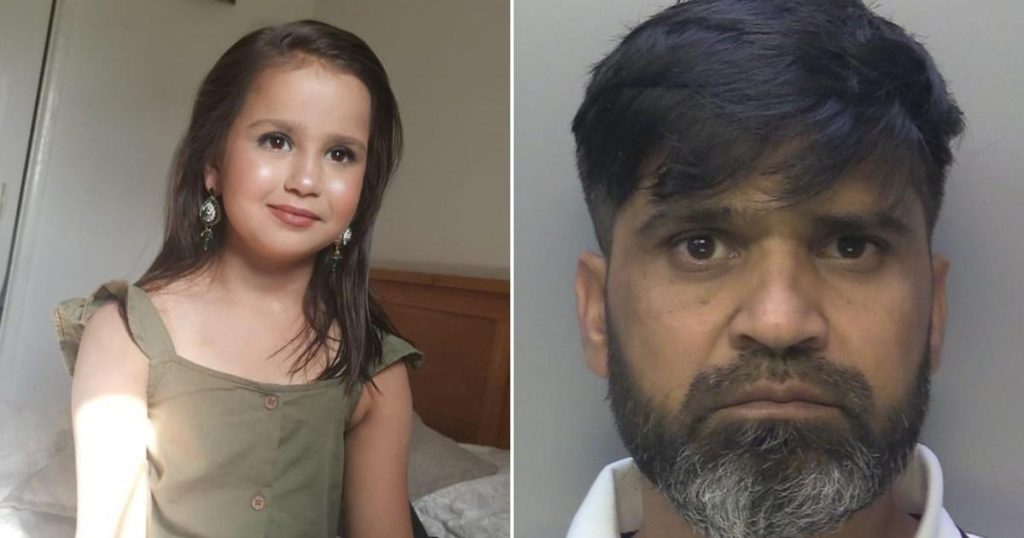The Tragic Case of Sara Sharif: A Life Cut Short by Unthinkable Cruelty
The harrowing details of 10-year-old Sara Sharif’s murder have sent shockwaves through the UK, revealing a horrific tale of prolonged abuse and neglect culminating in her untimely death. Urfan Sharif, Sara’s father, was sentenced to life imprisonment with a minimum term of 40 years for his heinous crime. The sheer brutality inflicted upon Sara, evidenced by the 71 fresh injuries discovered on her small body, paints a grim picture of the suffering she endured. These injuries, which included 25 broken bones, burns, scalding marks, and human bites, were not isolated incidents but rather the culmination of years of systematic torture and abuse at the hands of her father. Sara’s stepmother, Beinash Batool, was also convicted of murder and sentenced to life with a minimum of 33 years, while her uncle, Faisal Malik, received a 16-year sentence for causing or allowing the death of a child.
The severity of Sharif’s crimes, coupled with the devastating impact on Sara’s life, has prompted the Solicitor General to challenge his sentence as unduly lenient, seeking a review by the Court of Appeal. Simultaneously, Sharif, Batool, and Malik have lodged their own appeals against their respective sentences. This legal wrangling adds another layer of complexity to an already heartbreaking case, leaving the public grappling with the immense injustice suffered by a young girl who deserved protection and love. The Solicitor General’s intervention underscores the public outcry over the perceived inadequacy of Sharif’s sentence, reflecting a collective demand for justice to be fully served in this appalling case of child abuse.
The details of Sara’s ordeal, as revealed during the trial, are deeply disturbing. The young girl, described as "brave," "feisty," and "spirited," endured years of neglect, frequent assaults, and what can only be described as torture. The judge, Mr. Justice Cavanagh, highlighted Sharif’s twisted sense of entitlement to inflict harsh discipline upon his daughter, suggesting that he derived a perverse sense of power from his control over her. Sara’s resilience in the face of such relentless abuse serves as a testament to her strength of character, even as it amplifies the tragedy of her premature death.
The sentencing remarks delivered by Mr. Justice Cavanagh further underscore the gravity of the crimes committed against Sara. He condemned Sharif’s actions, highlighting the devastating impact of his abuse on a young life brimming with potential. He criticized Batool’s indifference to Sara’s suffering, stating that she "did not care about Sara enough to save her." Malik’s defense, that he was too preoccupied with his phone to notice the abuse, was dismissed as "preposterous." These stark pronouncements from the bench reflect the court’s recognition of the profound betrayal of trust committed by those entrusted with Sara’s care.
Beyond the immediate legal proceedings, the case raises broader questions about safeguarding vulnerable children and preventing such horrific tragedies from occurring. The fact that Sara’s abuse went undetected for so long points to potential systemic failures in child protection services. While the criminal justice system works to address the perpetrators of this specific crime, it is crucial to examine the broader context and identify any shortcomings in the systems designed to protect children from harm. This includes reviewing the effectiveness of child protection agencies, strengthening community support networks, and promoting greater awareness of the signs of child abuse.
The tragic death of Sara Sharif serves as a stark reminder of the vulnerability of children and the urgent need for vigilance and proactive measures to safeguard their well-being. Her story highlights the importance of robust child protection systems, community awareness, and a collective responsibility to ensure that no child suffers in silence. It is a call to action for society to prioritize child safety and to work tirelessly to create a world where every child can thrive free from fear and harm. While the legal proceedings continue, Sara’s legacy should be one that inspires lasting change and a renewed commitment to protecting the most vulnerable members of our society.


